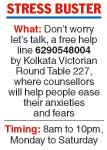Hundreds of people are calling counsellors to talk about their anxieties and fears at a time when almost every family has one or more people infected with Covid-19.
Some have lost family members and are in isolation, uncertain of the future. Some are worried because they know they are ignoring symptoms to avoid the financial implications of losing out on working days — something they cannot afford. Others who have family members in the hospital are anxious if the patient will come home safe.
The fear has amplified in the second wave of the pandemic because the Covid cases are “closer home”, and not a distant relative, which is taking a toll on people’s mental health.
Don’t worry let’s talk, a free helpline (6290548004), has been started by Kolkata Victorian Round Table 227 and clinical psychologist Gargi Dasgupta to help people talk and “not let their worries, fears and helplessness take control” during this raging pandemic.
The helpline is active from Monday to Saturday between 8am and 10pm.
Counsellors on the other end help to comfort people and ease their anxieties.

“There are two kinds of issues — one is related to health and the other is of social security and economic loss,” said Gargi Dasgupta, clinical psychologist, Calcutta Medical College and Hospital.
Dasgupta said for people earning between Rs 10,000 and Rs 15,000, staying in isolation for 15 days was not an option because it would make them “vulnerable to job loss”.
She said that even medical professionals who have to step out of their homes every day were anxious about their safety and that of their families.
“There are medical professionals who are worried about their safety because of their over-exposure. They are worried whether the precautions they are taking are enough,” said Dasgupta.
The pandemic-induced isolated lifestyle has detached people from their families and friends. Mobile phones have become their only source of entertainment, information and connection with the outside world.
“The phone is giving people company and is a source of entertainment but it can also be damaging because of the information available. There might be many positive things to take note of but a vulnerable mind is drawn to the negative and tends to register the negative things,” she said.
When people call the helpline, the counsellors have different approaches depending on the problem, Dasgupta said.
“We help them relax and ask them to write out the possibility of their fear becoming a reality.
When they start writing they are able to rationalise, which precedes their emotional response, and the possibility of their fear coming true goes down,” she said.
Another approach the counsellors use is to ask the callers to disengage themselves and think that a friend has come to them seeking suggestions.
“When they distance themselves from the problem, they are able to reflect and engage in a more rational way,” said Dasgupta.










